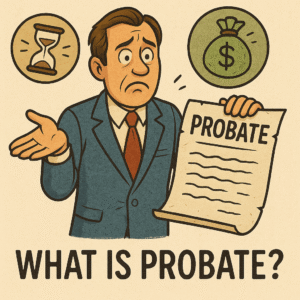Case Study: How John Smith Turned a Costly Estate Plan into a $58,000 Win for His Kids
John Smith had just hung up his work boots for good. At 65, he finally had time for lazy mornings, fishing trips, and long coffee chats with his kids, Sarah and David. Life was good — and John intended to keep it that way, even after he was gone.
He’d worked hard for what he had:
- A primary home worth $1 million
- A vacation cottage he’d bought decades ago for $200,000 — now valued at $500,000
- An investment portfolio worth another $1 million
- RRSPs totaling $500,000
- Plus personal treasures and keepsakes worth about $100,000
In all, his estate was worth $3.1 million.
John’s goal was simple: make sure Sarah and David received as much of that as possible, without unnecessary costs, delays, or headaches.
The Problem John Didn’t See Coming
Over coffee with his lawyer, John learned something that made him sit up straight: the vacation home could trigger a capital gains tax. Because it wasn’t his principal residence, the CRA would tax 50% of the $300,000 gain — and at his tax rate, that meant $80,295 gone.
And that wasn’t all. If John went the “traditional” route and simply left a will, the estate would face:
- Probate fees
- Administration costs
- Taxes on his RRSP
By the time it was over, Sarah and David could lose over $416,000 to taxes and fees.
Option 1: A Standard Will
If John chose this path, here’s how it would play out:
- Will creation: $1,011.35
- Estate administration: $20,753
- Probate fees: $46,500
- RRSP tax: $267,650
- Vacation home capital gains tax: $80,295
Total cost: $416,209.35
Net to children: $2,683,790.65
Each would get: $1,341,895.32
Option 2: An Alter-Ego Trust
Then his lawyer explained something different — an alter-ego trust. John could move his assets into the trust now, keep full control for the rest of his life, and then pass them to his kids directly — no probate, no court delays, no public process.
The costs?
- Trust setup: $8,475
- Admin consultation: $1,130
- Probate: $0
- RRSP tax: $267,650
- Vacation home capital gains: $80,295
Total cost: $357,550
Net to children: $2,742,450
Each would get: $1,371,225
The Result
By going with the trust, John’s estate would save $58,659.35. That’s an extra $29,329.68 in each child’s inheritance.
But for John, it wasn’t just about the money.
It was about:
- Speed — assets pass to Sarah and David without months of probate delays
- Privacy — no public probate record for strangers to comb through
- Control — he could still make changes during his lifetime
When John left the meeting, he felt lighter. He had a plan that would protect what he’d built, take care of his kids, and make sure his legacy stayed in the family — where it belonged.
Estate Planning Comparison — Standard Will vs. Alter-Ego Trust
| Item | Standard Will | Alter-Ego Trust |
|---|---|---|
| Will / Trust Setup | $1,011.35 | $8,475.00 |
| Estate Administration | $20,753.00 | $1,130.00 |
| Probate Fees | $46,500.00 | $0.00 |
| RRSP Taxes | $267,650.00 | $267,650.00 |
| Capital Gains Tax (Vacation Home) | $80,295.00 | $80,295.00 |
| Total Costs | $416,209.35 | $357,550.00 |
| Net Estate Value | $2,683,790.65 | $2,742,450.00 |
| Amount per Child | $1,341,895.32 | $1,371,225.00 |
Savings with Alter-Ego Trust:
- $58,659.35 total saved
- $29,329.68 more for each child





